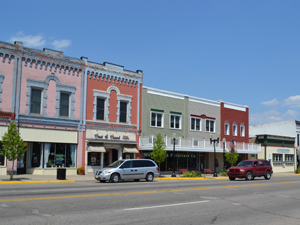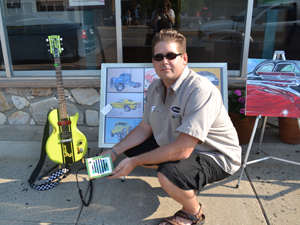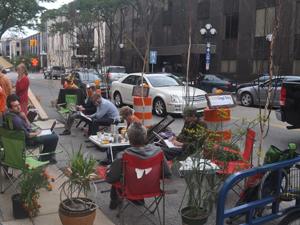Article from the upcoming July/August edition of The Review, Michigan Municipal League’s bi-monthly magazine.
Have you ever had a conversation with friends or colleagues about a cool vacant building in a great location in your downtown that would be a perfect place for a restaurant, children’s book store, or boutique retail? You may even know someone (or  several!) who shares the vision and would like to make that happen. But in today’s reality—a historic rehabilitation for an entrepreneur isn’t something that is supported by many traditional financing methods. And it’s too bad, you tell yourself, because if only that one project could get off the ground—oh how it would change the energy of that block, street, or downtown. You sigh, feeling a little hopeless, and think of a day when you can convince a bank to take a risk on the development. You go about your day and the building stays empty, sucking energy instead of emitting it.
several!) who shares the vision and would like to make that happen. But in today’s reality—a historic rehabilitation for an entrepreneur isn’t something that is supported by many traditional financing methods. And it’s too bad, you tell yourself, because if only that one project could get off the ground—oh how it would change the energy of that block, street, or downtown. You sigh, feeling a little hopeless, and think of a day when you can convince a bank to take a risk on the development. You go about your day and the building stays empty, sucking energy instead of emitting it.
Well, that story can now have a different ending. Something like this: You and your friends and colleagues talk to the entrepreneur who dreams of taking on that project, you go to crowdfundingMI.com and learn the basics of this new economic development financing tool, and realize that you can get that entrepreneur’s business plan up on a platform to help make the project a reality. The entrepreneur goes up for a “raise” to get the seed money from local residents who want to invest in that business because they want it in their community (and they like the idea of making some money in the process). Then a few months later, that entrepreneur has the seed money to leverage a traditional loan, the entrepreneur starts the redevelopment process and open shop, and a year  later—that spot in the downtown is filled with energy from the new business that community residents helped make happen. The business is successful, local residents who invested earn a profit, and you’ve been able to help transform your community!
later—that spot in the downtown is filled with energy from the new business that community residents helped make happen. The business is successful, local residents who invested earn a profit, and you’ve been able to help transform your community!
It’s all possible thanks to Michigan’s new crowdfunding law, PA 264. Passed in late December 2013, this new law allows new and existing Michigan businesses to raise capital from private, non-accredited Michigan investors. This is significant because non-accredited investors comprise 97 percent of the population, and now they can invest up to $10,000 per company, per year, in businesses incorporated or organized under Michigan law.
Accredited investors may invest any amount (an accredited investor is someone who makes over $200,000 per year or has $1,000,000 in assets). With a simple $100 application fee, a one-page Licensing and Regulatory Affairs registration, and a business plan, existing businesses with audited financials can raise up to $2 million from non-accredited investors, and new businesses can raise up to $1 million from non-accredited investors. There is no limit on what can be raised from accredited investors. These crowdfunding investments can be used to leverage additional capital from traditional banks or financial institutions.
These regulations outlined in the law are the most favorable any state has implemented to date—giving Michigan communities, entrepreneurs, and local investors a huge advantage to attracting and retaining talent. Because of this, the League has developed partnerships with two investment crowdfunding platforms, Localstake and Fundrise, and created crowdfundingMI.com to house educational materials around crowdfunding; examples of real deals and outcomes; and direct links with these established, nationally known companies who can help facilitate crowdfunding projects in your communities.
 The “crowd” component is a key factor in crowdfunding on many levels. By engaging local residents in local economic development investments, entrepreneurs gets to test the market before they go forward with much larger investments and begin to build their customer base. So if your group of friends decided to go forward with plans for that children’s book store and you wanted to raise investments of $100,000, but you only obtained $5,000 in investments, you may realize that the demand just might not be there for the business to flourish in the long run. And, from the community’s standpoint, building awareness and investment in local crowdfunding developments that do go forward leads to a buzz and excitement that leads to emotional connectivity within the community, which can spill over into many other efforts. And, at the same time, successful investment crowdfunding helps generate local wealth and economic activity.
The “crowd” component is a key factor in crowdfunding on many levels. By engaging local residents in local economic development investments, entrepreneurs gets to test the market before they go forward with much larger investments and begin to build their customer base. So if your group of friends decided to go forward with plans for that children’s book store and you wanted to raise investments of $100,000, but you only obtained $5,000 in investments, you may realize that the demand just might not be there for the business to flourish in the long run. And, from the community’s standpoint, building awareness and investment in local crowdfunding developments that do go forward leads to a buzz and excitement that leads to emotional connectivity within the community, which can spill over into many other efforts. And, at the same time, successful investment crowdfunding helps generate local wealth and economic activity.
Crowdfunding is the cutting-edge future of local development, and PA 264 provides the appropriate framework to make this a win-win for local entrepreneurs and the people who want to invest in their local community in a meaningful way.
